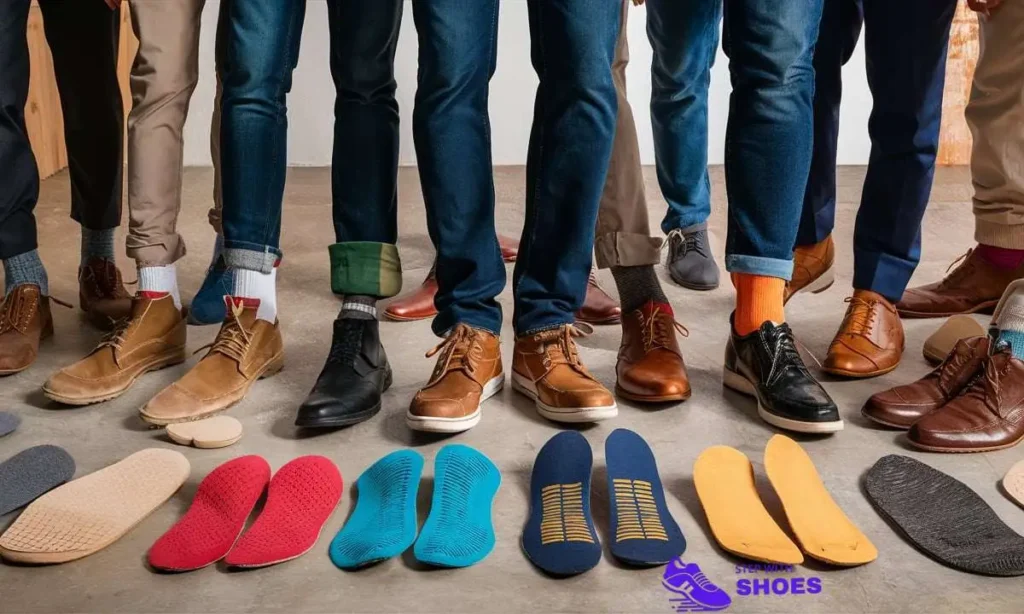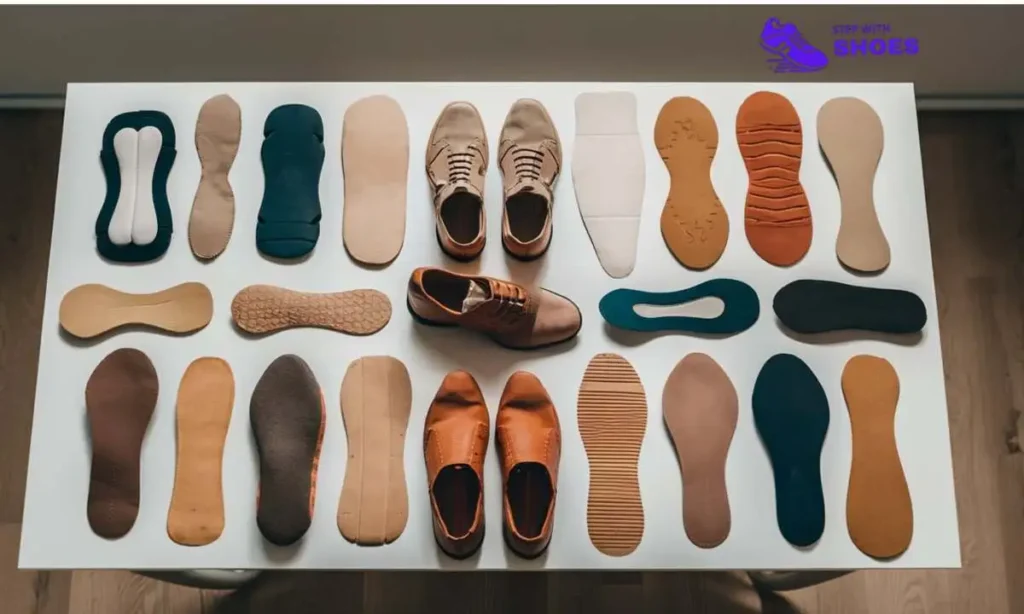To wear shoe inserts, first remove the original insoles from your shoes. Then, place the inserts inside, ensuring they fit snugly.
Shoe inserts, also known as insoles, provide comfort and support for your feet. They can alleviate pain, enhance stability, and improve overall foot health. Many people use them for various reasons, including sports, daily activities, or specific foot conditions. Choosing the right type of insert is crucial for achieving the best results.
Proper placement within your footwear maximizes its effectiveness. Understanding how to wear shoe inserts correctly helps you enjoy their benefits. Whether you opt for cushioned, arch support, or custom-made options, wearing inserts can significantly improve your walking experience. Prioritize comfort and support to keep your feet happy and healthy.
Introduction To Shoe Inserts
Shoe inserts are helpful accessories for comfort and support. They fit inside shoes to enhance foot health. Many people use them to relieve pain and improve posture. Understanding different types of inserts can help you choose the right one.
Types Of Inserts
Several types of shoe inserts cater to various needs:
- Orthotic Inserts: Custom-made for specific foot issues.
- Gel Inserts: Offer cushioning and shock absorption.
- Arch Support Inserts: Provide support for flat feet or high arches.
- Heel Cups: Help relieve heel pain and discomfort.
- Foam Inserts: Lightweight and comfortable for everyday use.
Benefits For Your Feet
Shoe inserts provide various benefits for foot health:
| Benefit | Description |
|---|---|
| Improved Comfort | Soft cushioning reduces pressure on feet. |
| Pain Relief | Alleviates pain from conditions like plantar fasciitis. |
| Better Posture | Supports alignment and reduces strain on muscles. |
| Shock Absorption | Helps absorb impact during activities. |
| Increased Stability | Enhances balance and reduces foot fatigue. |
Choosing the right shoe insert can transform your daily comfort.
Choosing The Right Inserts
Finding the right shoe inserts can make a big difference. Inserts provide support and comfort. They can help with foot pain and improve your overall walking experience.

By Foot Arch Type
Understanding your foot arch is key. There are three main types:
- Flat Arches: Choose soft, cushioned inserts. They help with stability.
- Normal Arches: Opt for medium support. These offer good balance.
- High Arches: Select firm inserts. They provide extra cushioning.
Knowing your arch type helps you select the right insert.
By Shoe Type
Different shoes need different inserts. Here’s a quick guide:
| Shoe Type | Recommended Inserts |
|---|---|
| Running Shoes | Shock-absorbing inserts |
| Dress Shoes | Thin, supportive inserts |
| Work Boots | Heavy-duty, cushioned inserts |
| Sneakers | Flexible, breathable inserts |
Selecting the right insert for your shoe enhances comfort.
By Activity
Your activity level matters in choosing inserts. Here are some suggestions:
- Running: Use cushioned, shock-absorbing inserts.
- Walking: Opt for supportive, breathable inserts.
- Hiking: Choose rugged, moisture-wicking inserts.
- Standing: Pick extra-cushioned, arch-supporting inserts.
Matching inserts to your activity boosts performance and comfort.
Proper Fitting Tips
Wearing shoe inserts correctly starts with a good fit. Proper fitting ensures comfort and support. Follow these tips to find the right size and type of insert.
Measuring Your Foot Size
To choose the best inserts, measure your foot size accurately. Here’s how:
- Stand on a piece of paper.
- Trace your foot with a pencil.
- Measure the length from heel to toe.
- Repeat for both feet; one may be larger.
Use the larger measurement to select your insert size. Always check the brand’s sizing chart for accuracy.
Inserts And Shoe Compatibility
Not all inserts fit every shoe. Here’s how to ensure compatibility:
- Check shoe type: Athletic, casual, or dress shoes?
- Consider thickness: Thick inserts may not fit snugly in tight shoes.
- Look for arch support: Choose inserts that match your foot’s arch type.
Use this table for guidance:
| Shoe Type | Recommended Insert Type |
|---|---|
| Athletic Shoes | Gel or foam inserts |
| Casual Shoes | Memory foam inserts |
| Dress Shoes | Thin, cushioned inserts |
Choose compatible inserts for maximum comfort. This prevents pinching and discomfort. Enjoy your day with supportive footwear.
Installation Steps
Installing shoe inserts can greatly improve comfort and support. Follow these simple steps to get it right.
Preparing Your Shoes
Start with a clean pair of shoes. Remove any old insoles or debris. Check the size of your shoe. Make sure the inserts fit properly.
- Use a soft cloth to clean the inside.
- Ensure no dust or dirt remains.
- Inspect for wear and tear.
Insert Placement
Place the inserts correctly for maximum benefit. Align them with the back of your shoe.
- Hold the insert with the arch facing inward.
- Slide it gently into the shoe.
- Make sure it sits flat and does not bunch up.
Check the fit by trying on the shoes. Walk a few steps to ensure comfort.
Adjustments For Comfort
Sometimes, slight adjustments may be needed. Here’s how to ensure a perfect fit:
- Remove the insert and trim edges if necessary.
- Reinsert the insert and check again.
- Wear the shoes indoors to test comfort.
Give your feet time to adjust. If discomfort persists, consider different inserts.
Breaking In Your Inserts
Breaking in shoe inserts is essential for comfort. Properly fitting inserts can enhance your walking experience. Follow these tips to ensure a smooth transition.

Initial Feel And Adjustments
When you first wear your inserts, pay attention to how they feel. Here are some key points to consider:
- Comfort Level: Inserts should feel snug but not tight.
- Arch Support: Ensure the arch aligns with your foot.
- Pressure Points: Identify any uncomfortable spots.
Make minor adjustments as needed. Trim the inserts if they are too long. Use scissors for precise cutting.
Gradual Introduction
Start wearing your inserts for short periods. Gradually increase the time as your feet adapt. Here’s a simple plan:
| Days | Wear Time |
|---|---|
| 1-2 | 30 minutes |
| 3-4 | 1 hour |
| 5-7 | 2 hours |
| 8+ | All day |
Monitor your comfort level each day. Stop wearing them if discomfort arises. Take breaks to let your feet rest.
Following these steps helps your feet adjust smoothly. Enjoy the benefits of your new shoe inserts!
Maintenance And Care
Taking care of your shoe inserts is essential for comfort and longevity. Proper maintenance keeps them fresh and effective. Follow these tips for optimal care and usage.
Cleaning Techniques
Regular cleaning helps remove dirt and odors. Here are simple cleaning methods:
- Hand Wash: Use mild soap and warm water.
- Air Dry: Let them dry completely before use.
- Machine Wash: Check the label. Some inserts are machine washable.
For sticky residues, use a damp cloth. Avoid harsh chemicals. They can damage the materials.
When To Replace Them
Replacing your shoe inserts is crucial for foot health. Look out for these signs:
| Signs of Wear | Action Needed |
|---|---|
| Visible Cracks | Replace immediately |
| Loss of Cushioning | Consider replacement |
| Unpleasant Odors | Wash or replace |
| Discomfort | Check for wear and replace |
Typically, replace inserts every 6 to 12 months. This depends on usage and type. Regular checks ensure your inserts provide the support you need.
Common Mistakes To Avoid
Wearing shoe inserts can improve comfort and support. However, many people make mistakes that reduce their effectiveness. Understanding these common pitfalls can enhance your experience.
Ignoring Foot Pain
Ignoring foot pain is a big mistake. Some believe inserts will fix everything. Pain signals that something is wrong. Addressing pain early helps prevent worse issues.
- Consult a healthcare professional.
- Evaluate the cause of your discomfort.
- Don’t wait for pain to worsen.
Overuse
Overusing shoe inserts can lead to new problems. Your feet need time to adjust. Wearing them all day, every day is not ideal.
- Start with short periods.
- Gradually increase usage time.
- Take breaks to allow foot recovery.
Improper Fit
An improper fit can ruin the benefits of shoe inserts. Inserts should match your shoe size and shape. An ill-fitting insert can cause more harm than good.
| Action Needed | Effect |
|---|---|
| Too Loose | Slips and causes instability. |
| Too Tight | Compresses the foot and causes pain. |
| Wrong Shape | Fails to provide necessary support. |
Always check for the right fit before using your inserts. A proper fit enhances comfort and support.
Success Stories
Many people have transformed their lives with shoe inserts. Their stories show how inserts improve comfort and performance. Let’s explore two main groups that benefit greatly: athletes and everyday users.
Athletes And Inserts
Athletes often face foot fatigue and injuries. Shoe inserts provide support and enhance performance. Here are some success stories from athletes:
- Runner: After using inserts, Sarah improved her speed and reduced pain.
- Basketball Player: Mike found better stability, helping him jump higher.
- Soccer Player: Emma eliminated blisters and enjoyed longer practices.
Inserts help athletes in various sports. They support arches and cushion impacts. This leads to improved performance and fewer injuries.
Everyday Comfort Improvements
Shoe inserts are not just for athletes. Many everyday users experience great comfort. Here are some success stories from people who made a change:
| Name | Issue | Improvement |
|---|---|---|
| John | Back pain | Reduced pain by 50% with inserts |
| Lisa | Flat feet | Felt supported and more active |
| Tom | Foot fatigue | Enjoyed walking longer distances |
Everyday users find relief from common foot problems. Inserts provide arch support and cushion. Users report feeling energized and more active.
These success stories highlight the power of shoe inserts. They bring comfort to athletes and everyday individuals alike.
Frequently Asked Questions
How To Properly Use Shoe Inserts?
Choose the right type of shoe insert for your needs. Clean your shoes and inserts regularly. Insert them snugly for optimal support. Gradually increase wear time to avoid discomfort. Replace worn inserts to maintain effectiveness.
Are You Supposed To Put Insoles On Top Of Insoles?
No, you shouldn’t put insoles on top of insoles. This can create discomfort and reduce support. Instead, choose a single pair that meets your needs. Ensure proper fit and comfort for optimal foot health. Always consult a specialist if uncertain about insoles for your footwear.
Which Way Round Do Insoles Go?
Insoles typically have a specific orientation. The arch support should align with your foot’s arch. The textured side usually faces up for grip and comfort. Ensure the insole fits snugly inside the shoe for optimal support. Always check for any labels or indicators for correct placement.
Conclusion
Wearing shoe inserts can significantly enhance comfort and support. They help alleviate pain and improve posture. With the right fit and style, you can enjoy all-day relief. Remember to choose inserts that match your footwear and lifestyle. Elevate your shoe game today for a healthier, happier you.



Leave a Reply